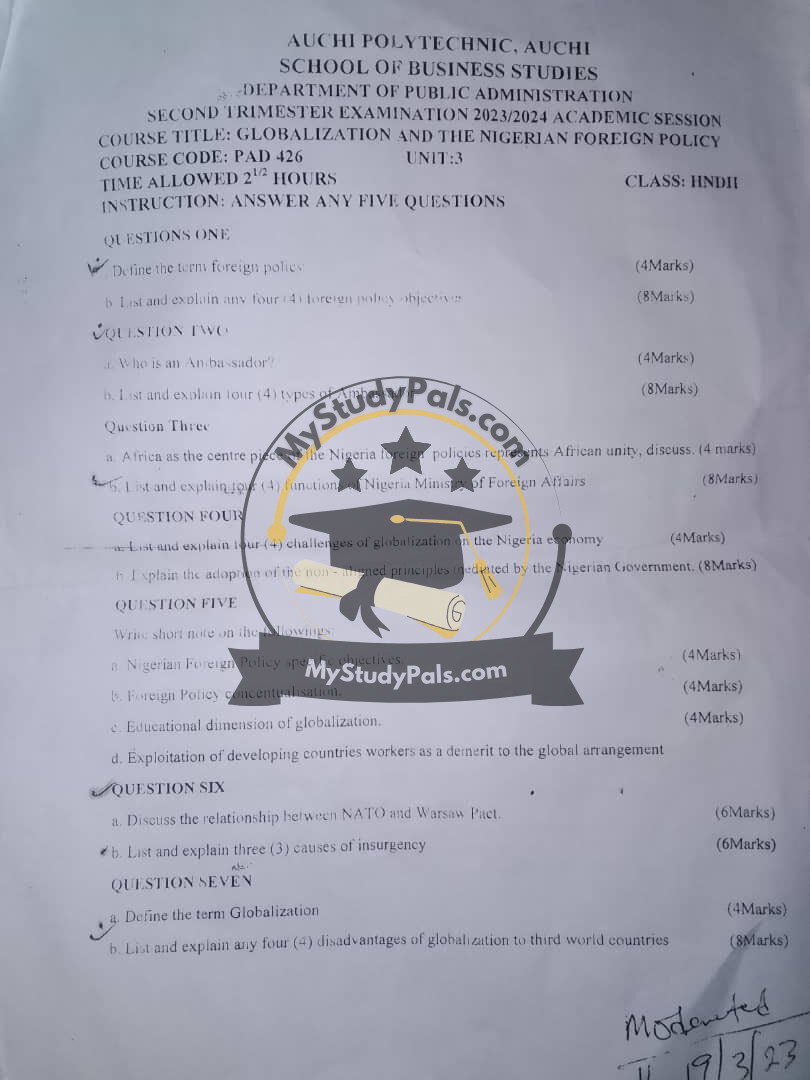ANWSER
Question One:
a. Define the term foreign policy
Foreign policy refers to a government’s strategy in dealing with other nations, aimed at safeguarding national interests, promoting peace, and fostering international cooperation. It encompasses diplomatic, economic, military, and cultural relations.
b. List and explain any four (4) foreign policy objectives
1. National Security: Protecting the country from external threats through alliances, defense pacts, and intelligence sharing.
2. Economic Prosperity: Promoting trade, foreign investments, and access to global markets to boost the economy.
3. Promotion of Ideology: Spreading national values such as democracy, human rights, or socialism to influence other nations.
4. International Cooperation: Engaging in multilateral organizations (e.g., UN, AU) to address global challenges like climate change and terrorism.
—
Question Two:
a. Who is an Ambassador?
An ambassador is a high-ranking diplomat appointed by a country to represent its interests in a foreign nation or international organization, facilitating diplomacy and negotiations.
b. List and explain four (4) types of Ambassador
1. Resident Ambassador: Permanently stationed in a host country to manage bilateral relations.
2. Non-Resident Ambassador: Represents their country in multiple nations without a fixed base.
3. Special Envoy: Appointed for a specific mission, such as conflict resolution or trade deals.
4. Career Ambassador: A professional diplomat with extensive experience, often rising through the foreign service ranks.
—
Question Three:
a. Africa as the centerpiece of Nigeria’s foreign policy represents African unity, discuss
Nigeria prioritizes African solidarity, advocating for decolonization, peacekeeping (e.g., ECOWAS interventions), and economic integration (e.g., AfCFTA). This aligns with its leadership role in the AU and commitment to Pan-Africanism.
b. List and explain four (4) functions of Nigeria’s Ministry of Foreign Affairs
1. Diplomatic Representation: Manages embassies and consulates to protect citizens and promote Nigeria’s image abroad.
2. Policy Formulation: Develops strategies to advance national interests in global affairs.
3. Consular Services: Issues visas, assists Nigerians overseas, and resolves cross-border disputes.
4. International Negotiations: Engages in treaties, trade agreements, and UN resolutions.
—
Question Four:
a. List and explain four (4) challenges of globalization in the Nigerian economy
1. Dependency on Imports: Over-reliance on foreign goods stifles local industries.
2. Unequal Trade: Exploitation by developed nations in trade agreements.
3. Cultural Erosion: Westernization undermines indigenous traditions.
4. Brain Drain: Skilled workers migrate abroad for better opportunities.
b. Explain the adoption of the non-aligned principles mediated by the Nigerian Government
Nigeria’s non-aligned stance during the Cold War avoided alignment with either the US or USSR, focusing instead on African unity, neutrality in conflicts, and multilateral diplomacy to maintain sovereignty.
—
Question Five:
a. Nigerian Foreign Policy specifics
Nigeria’s foreign policy emphasizes African unity, economic diplomacy, non-alignment, and global cooperation through the UN and AU.
b. Foreign Policy contextualisation
This involves adapting foreign policy to Nigeria’s historical, cultural, and economic realities, ensuring relevance in addressing contemporary global challenges.
c. Educational dimension of globalization
Globalization enhances access to cross-border education (e.g., online learning, student exchanges) but may marginalize local curricula.
d. Exploitation of developing countries’ workers as a demerit to the global arrangement
Multinational corporations often underpay workers in developing nations, perpetuating poverty and inequality in the global labor market.
—
Question Six:
a. Discuss the relationship between NATO and Warsaw Pact
NATO (Western bloc) and the Warsaw Pact (Eastern bloc) were rival military alliances during the Cold War, representing US-Soviet ideological divides. Both dissolved post-Cold War, though NATO persists.
b. List and explain three (3) causes of insurgency
1. Political Marginalization: Exclusion from governance fuels rebellion.
2. Economic Inequality: Poverty and unemployment drive radicalization.
3. Religious Extremism: Ideological manipulation for violent agendas.
—
Question Seven:
a. Define the term Globalization
Globalization is the interconnectedness of nations through trade, technology, culture, and politics, creating a integrated global system.
b. List and explain any four (4) disadvantages of globalization to third world countries
1. Economic Dependence: Over-reliance on foreign aid and imports.
2. Loss of Sovereignty: Policies influenced by powerful nations/IMF-WB conditions.
3. Environmental Degradation: Exploitation of natural resources by foreign firms.
4. Cultural Homogenization: Erosion of local traditions by dominant cultures.
—


